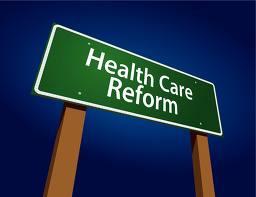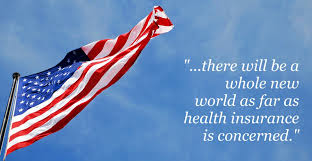 I am not a healthcare expert, and I promise not to play one today. However, the Affordable Care Act (aka Obamacare) has been mentioned in passing a handful of times in meetings I’ve had with non-profit board and staff members over the last few months. Of course, when things like this happen, it tweaks my curiosity and normally ends up here as a blog post. Today, I thought I’d quickly touch upon the quickly evolving topic of healthcare and the non-profit sector and how everyone needs to start paying attention.
I am not a healthcare expert, and I promise not to play one today. However, the Affordable Care Act (aka Obamacare) has been mentioned in passing a handful of times in meetings I’ve had with non-profit board and staff members over the last few months. Of course, when things like this happen, it tweaks my curiosity and normally ends up here as a blog post. Today, I thought I’d quickly touch upon the quickly evolving topic of healthcare and the non-profit sector and how everyone needs to start paying attention.
In my experience throughout the last few decades, I’ve seen non-profit organizations occupy two very opposite ends of the spectrum when it comes to healthcare and employee benefits. These two generalizations can be summed up as follows:
- They are expensive and the agency does everything in its power to avoid offering them to its employees.
- They are provided to employees generously as a way to compensate for low wages and entice employees not to leave for better salaries in the for-profit sector.
There is an increasing number of news stories about Obamacare as we inch closer and closer to implementation of the law. As this happens, it is top of mind for executive directors and their non-profit boards. As I mentioned in the introductory paragraph of this blog, I’ve heard both board and staff members mentioning things in passing on this subject.
Of course, the thing that worries me most is that all of the passing comments I’ve heard involve verbiage such as:
- We’ll see if . . .
- Obamacare might . . .
- We’re not sure, but if . . .
I recent read an online article published at Online Athens, which is the website for the Athens Banner-Herald newspaper, about non-profit organizations and what the Affordable Care Act means for them. It was this paragraph in the story that sent chills up my spine and inspired this blog post:
“Local nonprofits contacted about the tax credit were unaware of their eligibility and did not want to comment at the time of publication.”
Let’s please face facts:
- Many non-profit organizations are small, under-resourced, and fragile.
- These organizations tread water on most days and celebrate just keeping their doors open for another few months.
- These agencies don’t have their eyes on things like the Affordable Care Act because throughout time much of what the federal government has done only applies to larger employers with 50 or more employees (and many non-profits aren’t this big)
The Athens Banner-Herald did a nice job of making this point when they ended their article with this:
“There is no requirement on employers to provide health insurance, but there is a penalty under the Affordable Care Act’s employer “shared responsibility” provisions for employers with 50 or more full-time employees that do not provide a minimum level of insurance coverage that goes into effect in 2015. The Act does not require employers to provide health insurance to part-time workers and nonprofits that employ fewer than 50 employees will not be subject to employer-shared responsibilities.”
Regardless, the fact of the matter is that ALL non-profit organizations need to start paying attention and educating themselves about the changing face of the healthcare sector.
 Why?
Why?
There is this thing called the “individual mandate“. To make a long story short, this means that most Americans will soon be required to have some sort of health insurance coverage. It also means that health insurance coverage will soon be on your employees’ minds. So, don’t be surprised when you start to hear things around your proverbial workplace water cooler like:
- Why doesn’t our employer offer us health coverage?
- Would it be cheaper to talk to our employer about adding employee subsidized health benefits or purchasing a policy through the government-run insurance exchange?
- Since my agency can’t/won’t offer health benefits and I now have to pay for private insurance, I wonder if I can push for a better year-end raise to help offset some of these new costs?
- Can I still afford to work in the non-profit sector? Or should I be looking more closely at sector jumping and applying for jobs that offer health insurance?
Sure . . . you may be a small non-profit organization with fewer than 50 employees, but don’t think that none of this is going to effect you. None of this is meant to serve as commentary. I am only trying to make the point that every agency should start thinking about healthcare as changes start to occur and they lead to unanticipated questions and additional changes.
My best advice is to start educating yourself about the Affordable Care Act. Take a few small baby steps and start reading articles and attending free webinars and seminars on the topic. BE PROACTIVE! The following are just a few online resources you may want to check out in your spare time:
- Online Athens: “Affordable Care Act offers tax credits to nonprofits“
- Blue Cross Blue Shield: “Health Care Reform and You“
- Kaiser Permanente: “Understanding the Affordable Care Act“
Let’s use today’s blog post as a starting point for many small non-profit organizations. If you currently work at an agency focused on helping with implementation of this new law, please use the comment box below to share a few thoughts or point folks in the direction of online resources. If you’ve attended a webinar or workshop and learned something worth sharing, please consider taking a moment to share it here.
Here’s to your health!
Erik Anderson
Founder & President, The Healthy Non-Profit LLC
www.thehealthynonprofit.com
erik@thehealthynonprofit.com
http://twitter.com/#!/eanderson847
http://www.facebook.com/eanderson847
http://www.linkedin.com/in/erikanderson847

Great post Erik! As you know, I work as Community Outreach Liaison for an area Federally Qualified Health Center that meets the medical and dental needs of all, regardless of ability to pay, and I can say there are a lot of changes coming. It reminds me of when we used to play hide and seek and scream, “Ready or not! Here I come!” In this case, we have to make ourselves ready, and there are a lot resources to do so.
I have also found a lot of confusion surrounding the Affordable Care Act. Having said that, our organization, Greater Elgin Family Care Center has received federal and state funding for In Person Counselors who can assist in education and enrollment.
If anyone is in the Greater Elgin area and would like to learn more about the Affordable Care Act, please let me know. We can come to you to give talks to your staff, your clients, or any one who might want to learn more! Rose Reinert, rreinert@gefcc.org
Rose . . . when I was writing that post about Obamacare, you were one of a small handful of people who I had in mind.
Thanks for weighing in with your knowledge, and a double thank you for making the offer that you made to Elgin area non-profits.
You’re the absolute best!
Excellent article. I am amazed how many small businesses and non-profits have not known of or used the tax credit in effect since 2010! What are your thoughts about voluntary supplemental benefit plans combined with high deductible health plans which could be affordable to many charities?
Thanks for weighing in, Cynthia. I am not a qualified insurance professional. So, I won’t weigh-in with an opinion. My suggestion is that you contact someone who specialized in insurance and specifically works with non-profit organizations to get an answer to that question.
With that being said, I am always wary about high deductible health plans. Sure, they are affordable for the agency, but when the time comes they aren’t very affordable for the employee because they don’t have the money to pay for a high deductible. In the end, the employee is angry at the insurance company and their employer. Just my two cents for whatever it is worth.
My best advice to any organization looking at this as an option is to engage their employees and include voice in the decision making process.